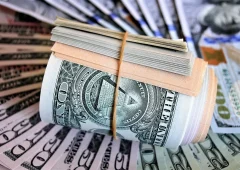Fed Will Cut Rates This Year, According to Bloomberg Analyst
15.07.2024 8:30 2 min. read Alexander Stefanov
Bloomberg analyst Mike McGlone anticipates significant developments at the Federal Reserve, foreseeing potential interest rate cuts in response to recent shifts in US equities.
This marks a pivotal moment as the central bank navigates a changing economic landscape characterized by easing inflationary pressures and softening labor market conditions.
McGlone draws comparisons to historical rate hike cycles, highlighting precedents where rate reductions followed extended periods of tightening policy, potentially mirroring the current trajectory.
Yeah, the Fed’s gonna cut rates. From 2004-06, the #FederalReserve hiked 425 bps and the surprise index floor came in December 2006. September 2007 marked the first rate cut. July 2023 was the last of 525 bps of rate hikes that started in 1Q22. Sticky #inflation may delay Fed… pic.twitter.com/sYl6xnD214
— Mike McGlone (@mikemcglone11) July 13, 2024
Federal Reserve Chair Jay Powell and other officials signal readiness to adjust monetary policy, citing improved control over inflation and a cautious approach to sustaining economic growth. Recent economic data supports the case for easing, with indicators pointing towards manageable inflation levels and moderate job market adjustments.
This backdrop sets expectations for the Fed to announce a 25 basis point rate cut in September, with potential for additional measures depending on economic indicators and global financial developments.
Market sentiment reflects growing confidence in the Fed’s ability to steer a balanced course, with traders pricing in anticipated rate cuts to stimulate economic activity and bolster market stability.
The Fed’s strategy aims for a “soft landing,” aiming to curb inflationary pressures without jeopardizing employment gains, aligning with global efforts among central banks to foster sustainable economic recovery in the post-pandemic era.
-
1
Japan Faces Mounting Financial Stress as Bond Market Cracks
20.05.2025 9:00 1 min. read -
2
Jamie Dimon Says U.S. Recession Still a Real Possibility Amid Global Instability
17.05.2025 19:00 1 min. read -
3
JPMorgan Sees Slow Growth Ahead But No Recession in 2025
18.05.2025 10:00 1 min. read -
4
Cathie Wood Sees Unexpected Upside in Tariff Tensions
20.05.2025 18:00 1 min. read -
5
U.S. Set to Loosen Bank Capital Rules Amid Growing Regulatory Debate
20.05.2025 11:00 2 min. read
Elon Musk Says Congress Is Bankrupting America
Tensions are escalating in Washington as Elon Musk publicly condemned a sweeping federal spending bill backed by Donald Trump, accusing lawmakers of driving the U.S. toward bankruptcy.
Trump Defends Tariffs as Legal Battles and Global Trade Talks Escalate
Donald Trump is doubling down on his pro-tariff stance, crediting the policy for what he calls a booming U.S. economy.
Robert Kiyosaki Warns of Deepening Financial Crisis, Urges Shift to Bitcoin and Precious Metals
Robert Kiyosaki, author of Rich Dad Poor Dad, has raised alarm bells once again—this time warning that the financial system may already be in the early stages of a historic downturn.
Jamie Dimon Warns U.S. Risks Losing Dollar Dominance Without Swift Reform
JPMorgan Chase CEO Jamie Dimon has delivered a stark message about America’s financial trajectory, cautioning that the U.S. dollar’s role as the world’s reserve currency could come under threat if deep-rooted fiscal problems aren’t addressed soon.
-
1
Japan Faces Mounting Financial Stress as Bond Market Cracks
20.05.2025 9:00 1 min. read -
2
Jamie Dimon Says U.S. Recession Still a Real Possibility Amid Global Instability
17.05.2025 19:00 1 min. read -
3
JPMorgan Sees Slow Growth Ahead But No Recession in 2025
18.05.2025 10:00 1 min. read -
4
Cathie Wood Sees Unexpected Upside in Tariff Tensions
20.05.2025 18:00 1 min. read -
5
U.S. Set to Loosen Bank Capital Rules Amid Growing Regulatory Debate
20.05.2025 11:00 2 min. read


